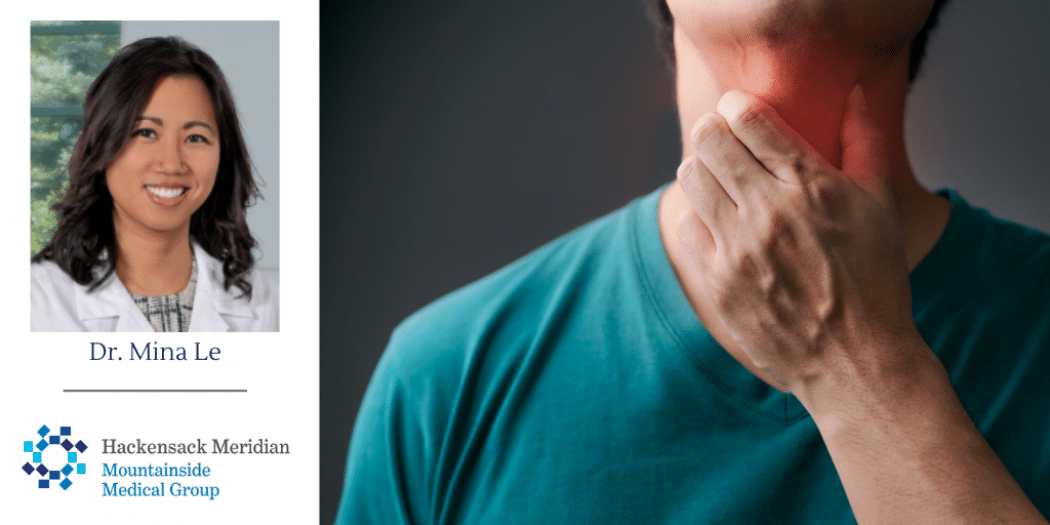Throat pain is a commonly experienced annoyance, and the origins of the pain are wide-ranging. From smoking to a viral infection, throat pain can be low-risk or severe, depending on its cause.
We asked Mountainside Medical Group’s Otolaryngologist – Head and Neck Surgeon, Mina Le, M.D., to explain throat pain in more detail.
“Most commonly, throat pain is caused by irritation or inflammation,” Dr. Le said. “Irritation might be from dryness, or air pollutants, or smoking cigarettes or overusing your voice. Inflammation might be from acid reflux or a passing viral infection. Strep throat, which is a bacterial infection, is more likely if you are young and still have your tonsils. There are rarer types of bacterial throat infections that can start from a bad tooth. If you’re older, throat cancer is a possibility.”
While figuring out the cause of throat pain may be step one, figuring out how to soothe the pain is an anxiously awaited second step.
“If you’re looking to relieve pain in the throat, I would first suggest increasing your water intake,” Dr. Le said. “Hot tea is a longstanding home remedy; you can choose to add lemon or honey. If the sore throat has only been around for a day or two, you can try over-the-counter (OTC) treatments such as Sucrets, honey lozenges or Chloraseptic (Phenol). If the sore throat has been around for weeks, try an over-the-counter antacid such as Tums, Pepcid or Prilosec OTC.”
Dr. Le warns there are no guarantees to a fast fix, but hot tea with honey is your best bet when it comes to home remedies.
If you’re experiencing chronic sore throat, it may be time to reevaluate your diet and lifestyle and consult a healthcare professional to get to the root cause of the pain.
“The most common cause of chronic sore throat is acid reflux,” Dr. Le said. “Take an antacid such as Tums (the mildest), Pepcid or Prilosec OTC (the strongest). Cut down on your intake of spicy food, fatty food, tomatoes, citrus, chocolate, coffee, tea, alcohol and soda. Eat smaller meals and stay upright for three hours after you eat. If you smoke, stop smoking, and remember to always stay well-hydrated.”
Your primary care provider (PCP) or an ear, nose and throat (ENT) doctor are both good resources when you’re dealing with throat pain. Depending on the symptoms and severity, an ENT specialist may be able to provide additional answers.
“If you’re already scheduled to see a PCP, or if you also have other medical concerns to discuss, your PCP is fine,” Dr. Le said. “As an ENT, I am happy to see you at any point in the process where you no longer feel comfortable dealing with a sore throat on your own at home. An ENT will have scope equipment to examine your throat more thoroughly. If throat pain is accompanied by other ENT symptoms such as trouble swallowing, changes in voice or ear pain, an ENT visit makes a lot of sense. If throat pain is severe and you cannot eat or have trouble breathing, go straight to the emergency room.”
If you’re experiencing throat pain, there are options to help. Schedule an appointment with Dr. Le today.
Dr. Le sees patients in the Mountainside Medical Office Building located at 311 Bay Avenue, Suite 300, Glen Ridge, New Jersey. New patients are welcome and may visit Dr. Le’s provider page to request an appointment or call 973-798-4777.

